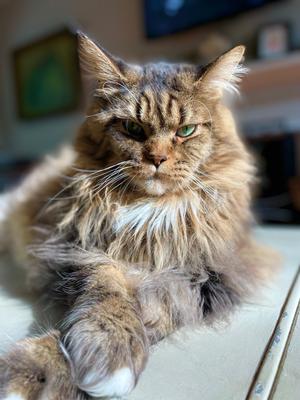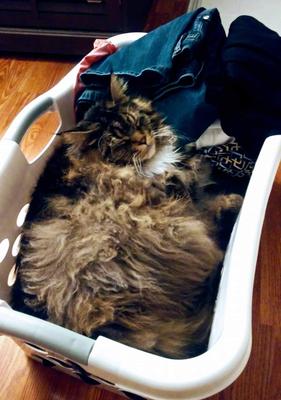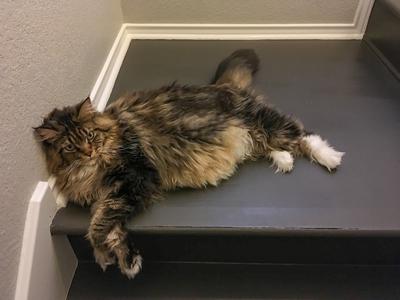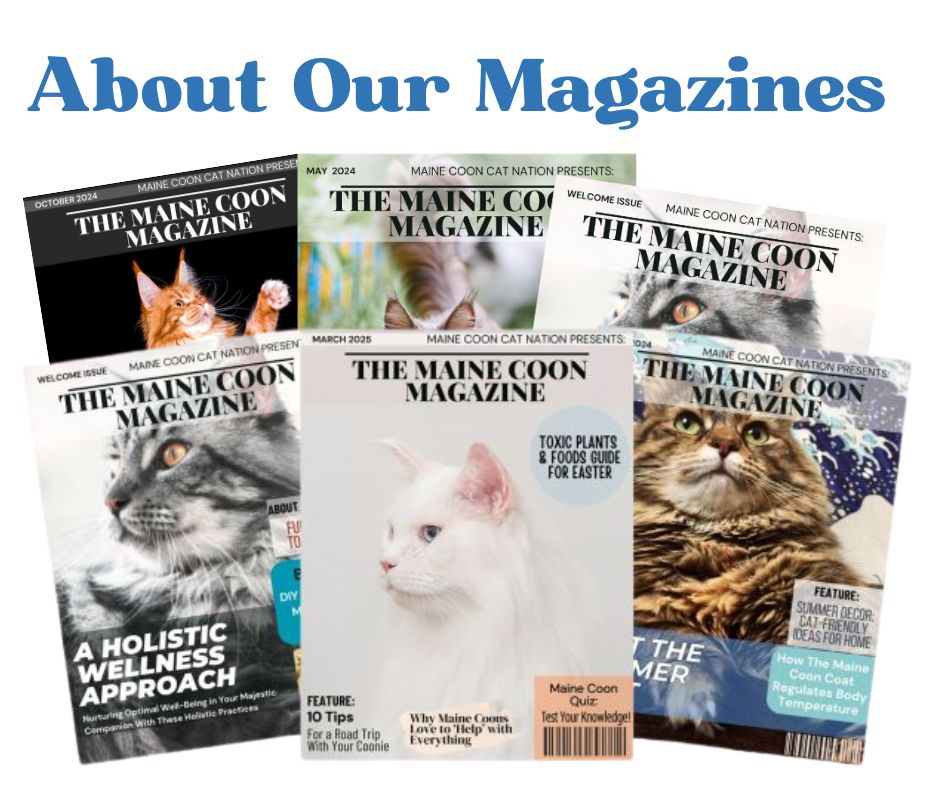- Home
- Maine Coon Cat Health
- Urinary Tract Infections in Cats
Urinary Tract Infections in Cats
A Story About UTIs and Rehoming a Maine Coon
by: The Maine Coon Cat Nation Community!
Originally, Artemis needed a new home due to his ongoing health challenges. It’s safe to assume he has since found a loving family.
This submission has been expanded to focus on the topic of urinary tract infections in cats, their causes, and tips for care.
Artemis’s Journey:
by: Amy in Austin, Texas
We got Artemis, a five-year-old purebred Maine Coon (DOB 7/14/18), with documents confirming his lineage. He was purchased from a Texas breeder for $4,000 as a kitten.
 Regal Artemis
Regal ArtemisIn August 2020, Artemis’s original owner, a dear friend of ours, sadly passed away. We took him in and have cared for him ever since.
In March 2021, he developed a urinary obstruction that required Perineal Urethrostomy (PU) surgery, costing over $8,000.
Since then, Artemis has had regular veterinary visits, grooming sessions, and a carefully managed diet to support his urinary tract health and weight management.
He currently weighs 23.4 lbs., down from 28 lbs., and the goal is to reach closer to 20 lbs.
Unfortunately, Artemis continues to experience recurrent urinary tract infections (UTIs). Cultures have not identified bacteria, and imaging has shown no blockages or stones.
 On the couch
On the couchHis treatment history includes several rounds of antibiotics, gabapentin for discomfort, and Solensia injections for inflammation. Despite these efforts, there has been no noticeable improvement.
We suspect stress may be a contributing factor, especially when I travel for work.
While my husband and Artemis share a bond, I am clearly his "person."
My frequent travel seems to upset him, and I cannot eliminate this part of my routine.
Artemis has been on Prozac for over a month to address potential stress, but it hasn’t made a significant difference.
Additionally, we have another cat, a 5 lb. Himalayan Seal Point Persian, who gets along well with Artemis, but we wonder if he might thrive as the only cat in a calm, one-on-one environment.
Despite his challenges, Artemis is a loving and sweet lap cat who enjoys cuddles and attention.
It breaks our hearts to consider rehoming him, but we believe he needs a home where his stress can be minimized, and his care can be more focused.
Understanding Urinary Tract Infections in Cats
What Are UTIs in Cats?
Urinary tract infections occur when bacteria enter a cat’s urinary system, leading to discomfort, inflammation, or difficulty urinating.
While UTIs are less common in cats than other urinary issues (such as bladder stones or Feline Lower Urinary Tract Disease), they can be persistent and challenging to treat.
Signs and Symptoms of UTIs
 In the laundry basket
In the laundry basketIt’s important to recognize the signs of a UTI in cats early so you can seek veterinary care. Common symptoms include:
- Straining or difficulty urinating.
- Frequent trips to the litter box with little to no output.
- Blood in the urine.
- Crying or vocalizing while urinating.
- Urinating outside the litter box (a possible sign of pain or stress).
Potential Causes and Risk Factors
Several factors can increase a cat's risk of developing urinary tract issues, including:
- Stress or anxiety.
- Insufficient water intake, leading to concentrated urine.
- Obesity or being overweight.
- Previous urinary obstructions or surgeries (e.g., PU surgery).
- Underlying medical conditions such as diabetes or kidney disease.
Preventing UTIs in Cats
Here are some tips to help reduce the risk of UTIs or manage urinary tract health:
- Hydration is Key: Ensure your cat drinks plenty of water. Consider a cat water fountain to encourage drinking or add water to wet food.
- Diet: Feed your cat a diet tailored to urinary tract health, as recommended by your veterinarian. Avoid feeding only dry food.
- Stress Reduction: Minimize stress in your cat’s environment by providing a consistent routine, quiet spaces, and interactive playtime.
- Regular Vet Visits: Routine check-ups can catch early signs of urinary issues before they become severe.
When to See a Veterinarian
If your cat shows any signs of a urinary tract issue, seek veterinary care immediately.
Untreated UTIs can lead to serious complications, such as kidney damage or life-threatening blockages.
If you’re dealing with a cat experiencing urinary tract infections, we encourage you to explore potential stressors and consult with your veterinarian for tailored solutions.
Comments:
Artemis and UTIs
By: BastetTheGoddess
I have a 12-year-old male Maine Coon mix. After he had two UTIs, I eliminated all dry food and treats from his diet.
I add a bit of water to his wet food and ensure he has fresh, clean, filtered water daily. He hasn’t had a UTI in over six years.
Please consider trying this and let his new human family know. Good luck with your beautiful boy!
 On the stairs
On the stairsChanca Piedra
By: Tamara
Try an herb called Chanca Piedra. It’s been proven effective for dissolving kidney stones and is safe for humans and animals. Best wishes! 😺
Managing UTIs Through pH and Water
By: RW
Have you considered the pH of Artemis’s water? I had a cat, Wally, who struggled with kidney crystals.
After noticing his bloodwork showed abnormal pH levels, I researched bottled water.
I found "Arrowhead" had a high pH (7+), while "Niagara" had a lower pH (-6). Switching to Niagara water and feeding him Iams Urinary Tract Formula dry food resolved the issue.
A fish tank pH monitor kit from a pet store helped me test the water. This simple change kept Wally healthy for the rest of his 16 years.
Editor's Note: If you’ve found this page while searching for information about urinary tract infections in cats, you’re likely looking for advice and personal experiences to help your cat.
While it’s helpful to learn from others and gather tips, it’s important to remember that feline UTIs are a medical issue that require proper diagnosis and treatment from a veterinarian.
This page is intended for informational purposes only and should not replace professional veterinary care.
If you suspect your kitty is experiencing urinary problems, please consult your vet right away to ensure they receive the care they need.
Top of Urinary Tract Infections in Cats
« Back to Maine Coon Health
Recent Articles
-
Today's Features
Apr 16, 25 09:54 PM
Today we have two classic Memory Lane pages to share!
Murphy & Candy Cane: Double the Maine Coon Charm - This adorable Maine Coon duo from our 2011 Photo Albums - Murphy and Candy Cane - brought doubl… -
Memory Lane Month Begins!
Apr 15, 25 10:22 PM
We're thrilled to start our "Memory Lane Month" event by visiting some cherished moments from our community! We're in the process of restoring meaningful community stories like this one, to preserve t… -
Will a Maine Coon Protect Its Owner From Danger or an Intruder?
Apr 09, 25 10:41 PM
Plenty of people are curious: Will a Maine Coon protect its owner if something happens? Let’s talk about what this means, and what kind of protector a Coonie is.



